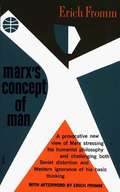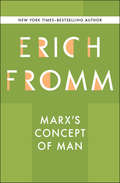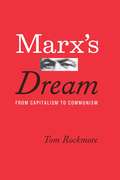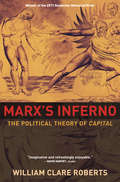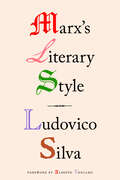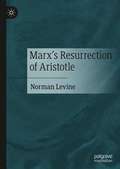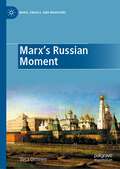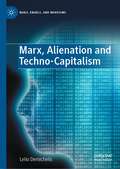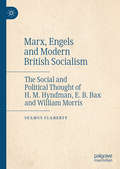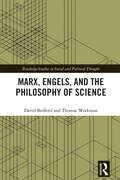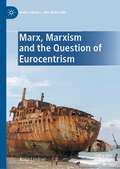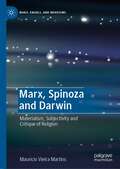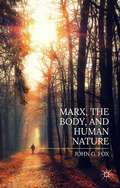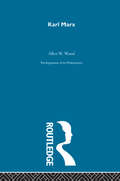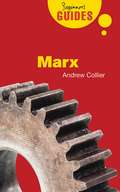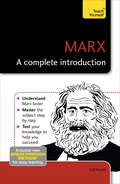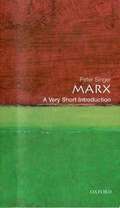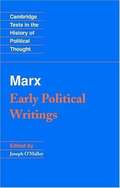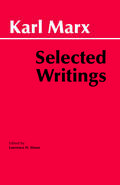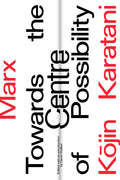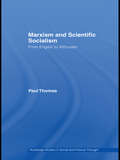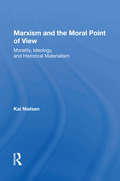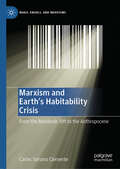- Table View
- List View
Marx's Concept of Man
by Erich H. FrommA provocative new view of Marx stressing his humanist philosophy and challenging both Soviet distortion and Western ignorance of his basic thinking.
Marx's Concept of Man: Including 'economic And Philosophical Manuscripts' (Bloomsbury Revelations Series)
by Erich FrommAn exploration of how Marx&’s ideas have been misused and misunderstood, from the New York Times–bestselling author of Escape from Freedom. In the Western world, and especially in the United States, Karl Marx is perceived as the spiritual godfather of Lenin and Stalin—someone bent on creating a state where everyone worships a centralized bureaucracy. Social philosopher Erich Fromm argues that Marx has been entirely misrepresented and misunderstood, and that Marx&’s ideas have been misappropriated to further causes antithetical to his true intentions. Fromm&’s study presents Marx as a humanist and social scientist. Painstakingly traveling through Marx&’s oeuvre, Fromm shows how Marx&’s real goal was to eliminate man&’s alienation, and allow individuals to live and appreciate a life of freedom. Furthermore, Fromm believes, Marx would have considered the Communist governments of Russia and Cuba as wrong-headed. Marx&’s Concept of Man also includes a selection of Marx&’s Early Writings, brought to English-speaking readers for the first time in 1961. This ebook features an illustrated biography of Erich Fromm, with rare images and never-before-seen documents from the author&’s estate.
Marx's Dream: From Capitalism to Communism
by Tom RockmoreTwo centuries after his birth, Karl Marx is read almost solely through the lens of Marxism, his works examined for how they fit into the doctrine that was developed from them after his death. With Marx’s Dream, Tom Rockmore offers a much-needed alternative view, distinguishing rigorously between Marx and Marxism. Rockmore breaks with the Marxist view of Marx in three key ways. First, he shows that the concern with the relation of theory to practice—reflected in Marx’s famous claim that philosophers only interpret the world, while the point is to change it—arose as early as Socrates, and has been central to philosophy in its best moments. Second, he seeks to free Marx from his unsolicited Marxist embrace in order to consider his theory on its own merits. And, crucially, Rockmore relies on the normal standards of philosophical debate, without the special pleading to which Marxist accounts too often resort. Marx’s failures as a thinker, Rockmore shows, lie less in his diagnosis of industrial capitalism’s problems than in the suggested remedies, which are often unsound. ? Only a philosopher of Rockmore’s stature could tackle a project this substantial, and the results are remarkable: a fresh Marx, unencumbered by doctrine and full of insights that remain salient today.
Marx's Inferno: The Political Theory of Capital
by William Clare RobertsMarx’s Inferno reconstructs the major arguments of Karl Marx’s Capital and inaugurates a completely new reading of a seminal classic. Rather than simply a critique of classical political economy, William Roberts argues that Capital was primarily a careful engagement with the motives and aims of the workers’ movement. Understood in this light, Capital emerges as a profound work of political theory. Placing Marx against the background of nineteenth-century socialism, Roberts shows how Capital was ingeniously modeled on Dante’s Inferno, and how Marx, playing the role of Virgil for the proletariat, introduced partisans of workers’ emancipation to the secret depths of the modern “social Hell.” In this manner, Marx revised republican ideas of freedom in response to the rise of capitalism.Combining research on Marx’s interlocutors, textual scholarship, and forays into recent debates, Roberts traces the continuities linking Marx’s theory of capitalism to the tradition of republican political thought. He immerses the reader in socialist debates about the nature of commerce, the experience of labor, the power of bosses and managers, and the possibilities of political organization. Roberts rescues those debates from the past, and shows how they speak to ever-renewed concerns about political life in today’s world.
Marx's Literary Style
by Ludovico SilvaMarx&’s Literary Style argues that a true understanding of Marx&’s work requires a careful study of his literary choicesIn Marx&’s Literary Style, the Venezuelan poet and philosopher Ludovico Silva argues that much of the confusion around Marx&’s work results from a failure to understand his literary mode of expression. Through meticulous readings of key passages in Marx&’s oeuvre, Silva isolates the key elements of his style: his search for an &“architectonic&” unity at the level of the text, his capacity to express himself dialectically at the level of the sentence, and, above all, his great gift for metaphor. Silva&’s unique sensitivity to Marx&’s literary choices allows him to illuminate a number of terms that have been persistently, and fatefully, misunderstood by many of Marx&’s most influential readers, including alienation, reflection, and base and superstructure. At the heart of Silva&’s book is his contention that we we cannot hope to understand Marx if we treat him as a scientist, a philosopher, or a literary writer, when he was in fact all three at once.Originally published in 1971, this is a key work by one of the most important Latin American Marxists of the twentieth century. This edition, which marks the first appearance of one of Silva&’s works in English, features an introduction by Alberto Toscano.
Marx's Resurrection of Aristotle
by Norman LevineThis book seeks to show how Karl Marx’s vision of communism was a continuation of Aristotle’s classical humanist philosophy. Challenging the Engelsian distortion of Marx, it presents a negation of previous interpretations of Marx which present him in materialist terms. Engels proposed a picture of the highest stage of communist society as an economic egalitarianism, a vision which became an axiom of Leninist-Stalinist-Soviet Communism. By contrast, here it is shown that Marx embraced the Aristotelian concept of “distributive justice”, of proportionate equality. Spanning the works of Marx, from his university education and doctoral dissertation on the differences between the Democritean and Epicurean philosophy of the atom, to the study of his Rheinische Zeitung period and the persistence of classical humanism in Marx’s defense of the freedom of the press, Levine skillfully reveals the gravitational pull between Marx and Aristotle.Showing how classical humanism is the dominant ethos in the communism of Marx, the book includes chapters on:Hegel as a transition point between Aristotle and MarxThe links between Marx’s theory of labor and Aristotle’s idea of the constitutive subject located in The Politics How the local methodologies of Aristotle and Hegel provided Marx with the social methodologies by which to interpret the functioning of capitalismMarx's Resurrection of Aristotle is the culmination of Norman Levine's life-long work to establish the correct placement of Marx and Marx’s communism within the classical humanist tradition.
Marx's Russian Moment (Marx, Engels, and Marxisms)
by Vesa OittinenThis book discusses Marx’s relations with Russia, which have always been ambivalent. In his youth, and indeed a good way into the 1860s, Marx might even be called a “Russophobe.” Around 1870, however, his views on Russia undergo a change; he becomes acquainted with a new kind of Russian radical and revolutionary movement and begins to study Russian. It becomes clear that Marx begins to feel that Russia is some kind of a “touchstone” for his theories. Offering a new and original interpretation of Marx’s theoretical development, Marx’s Russian Moment analyzes the following themes: Marx’s concept of ideology (as developed in the German Ideology) and its fortunes in Russia; Marx’s encounter with Bakunin and Russian nihilism; Marx’s and Engels’s studies of primitive societies; Engels’s views of the developmental perspectives of small Slavic nations; and Marx’s views on Finland, the Russian Grand Duchy. Considering these topics as “case studies,” Oittinen argues that Marx’s encounter with Russia substantially influenced Marx’s (and Engels’s) views not just on current political and economic matters but also on a philosophical and methodological level.
Marx, Alienation and Techno-Capitalism (Marx, Engels, and Marxisms)
by Lelio DemichelisIn this book, translated into English for the first time, Lelio Demichelis takes on a modern perspective of the concept/process of alienation. This concept—much more profound and widespread today than first described and denounced by Marx—has largely been forgotten and erased. Using the characters of Narcissus, Pygmalion and Prometheus, the author reinterprets and updates Marx, Nietzsche, Anders, Foucault and, in particular, critical theory and the Frankfurt School views on an administered society (where everything is automated and engineered, manifest today in algorithms, AI, machine learning and social networking) showing that, in a world where old and new forms of alienation come together, man is increasingly led to delegate (i.e. alienate) sovereignty, freedom, responsibility and the awareness of being alive.
Marx, Engels and Modern British Socialism: The Social and Political Thought of H. M. Hyndman, E. B. Bax and William Morris
by Seamus FlahertyThis book is a reception study of Karl Marx’s and Friedrich Engels’ ideas in Britain during the late nineteenth century and a revisionist account of the emergence of modern British socialism. It reconstructs how H. M. Hyndman, E. B. Bax, and William Morris interacted with Marx and ‘Marxism’. It shows how Hyndman was a socialist of liberal and republican provenance, rather than the Tory radical he is typically held to be; how Bax was a sophisticated thinker and highly influential figure in European socialist circles, rather than a negligible pedant; and it shows how Morris’s debt to Bax and liberalism has not been given its due. It demonstrates how John Stuart Mill, in particular, was combined with Marx in Britain; it illuminates other liberal influences which help to explain the sectarian attitude adopted by the Social Democratic Federation towards organised labour; and it establishes an alternative genealogy for Fabian socialism.
Marx, Engels and the Philosophy of Science (Routledge Studies in Social and Political Thought)
by David Bedford Thomas WorkmanThis book expounds the dialectical conception of science largely implicit in the writings of Marx and Engels, offering a sympathetic reconstruction of a philosophy of science commensurate with Marx’s thought. Drawing on a reading of dialectics found in Plato and Hegel, it recasts Marx’s implicit ontology in terms of dialectical conceptions of the world, as these conceptions have responded to the growing sophistication of modern science. It thus deepens our understanding of materialist philosophy as it relates to science and draws out Marx’s logic of science in light of continuing discussions. As such, it will appeal to philosophers with interests in the nature and development of science and Marxist thought.
Marx, Lenin and the Science of Revolution
by Max F. EastmanA critique of the science of Marxism by the American journalist and philosopher Max Eastman.
Marx, Marxism and the Question of Eurocentrism (Marx, Engels, and Marxisms)
by Kolja LindnerThis book mediates between postcolonial positions that criticize Marxist approaches (and Marx’s writings) for their Eurocentrism and defenders of Marx, who claim that this accusation is a myth. In different contributions to this volume, Kolja Lindner pleads for a differentiated assessment of the whole of Marx’s work, including less known manuscripts, and a theoretical reconstruction of various elements that have come into the focus of postcolonial critique: ethnocentrism, Orientalism, false universalism and the oblivion of modernity’s global entanglement. Against this background, two opportunities simultaneously arise: Marx’s Eurocentrism can be deconstructed and his growing awareness of global developments and cosmopolitan struggles established.
Marx, Spinoza and Darwin: Materialism, Subjectivity and Critique of Religion (Marx, Engels, and Marxisms)
by Mauricio Vieira MartinsMarx, Spinoza and Darwin presents a common thread in its argument: it shows how these authors—certainly with differences among themselves—consolidated a field of investigation that does not resort to transcendent or religious premises in approaching the phenomena they analyze. Thus, when Spinoza declared that the “will of God” is the “sanctuary of ignorance,” when Marx provocatively maintained that “criticism of religion is the premise of all criticism,” or when Darwin polemicized against a millennial creationist approach, all were taking a stand that invited us to view our world through a secular and immanent lens. In addition to this common thread, Martins discusses other issues present in the works of these thinkers, for instance the space that exists for human subjectivity from a Marxist perspective (which is not to be confused with philosophical “objectivism”): men and women are encouraged to act in the world. With this conceptual background, the concluding chapters of the book address the proliferation of some less examined Christian fundamentalisms in contemporary world, presenting an explanatory hypothesis for the phenomenon.
Marx, the Body, and Human Nature
by John FoxMarx, the Body, and Human Nature shows that the body and the broader material world played a far more significant role in Marx's theory than previously recognised. It provides a fresh 'take' on Marx's theory, revealing a much more open, dynamic and unstable conception of the body, the self, and human nature.
Marx-Arg Philosophers (Arguments Of The Philosophers Ser.)
by Allen WoodFirst published in 1999. Routledge is an imprint of Taylor & Francis, an informa company.
Marx: A Beginner's Guide (Beginner's Guides)
by Andrew CollierBreathing new life into the achievements of Karl Marx, this accessible and jargon-free introduction is a timely reminder of his undiminished influence. Andrew Collier's engaging text not only introduces the reader to Marx the revolutionary, but also redefines him as one of the first truly democratic thinkers. In a concise yet searching manner, Collier covers all the elements of marxist thought, from the early writings to such major texts as 'Capital' and the key themes of labour and society. Punctuating his study with a wide range of examples, from Aristotelian thought to Thatcherite policy, he explores the traditional notion of Marx the activist, while probing the apparent inconsistencies in his work and reclaiming his place as a philosopher and political theorist. Concluding with a thought-provoking assessment of Marx's pervasive influence on the political landscape of the twenty-first century. Collier's study highlights our own global inequalities and will be warmly welcomed by students, scholars and activists from a variety of backgrounds.
Marx: A Complete Introduction: Teach Yourself
by Gill HandsIs this the right book for me?Marx: A Complete Introduction will familiarize you with the revolutionary thinking of this significant man. It will take you through all the essential concepts - from class struggle to dialectical materialism. Expressing Marx's sometimes complex ideas in simple terms, and backed up with references to his own texts, this book gives you everything you need to know. Marx: A Complete Introduction includes:Chapter 1: Marx's early lifeEurope at the time of MarxThe early life of MarxUniversity lifeLife as a journalistThe Communist ManifestoExileChapter 2: Marx's later lifeThe move to LondonFamily life in LondonMarx and EngelsWork in LondonDas KapitalThe InternationalThe later yearsChapter 3: Marx and philosophyA brief history of philosophyWhich philosophers influenced Marx?Ancient Greek philosophersEuropean philosophyUtopian SocialistsRevolutionaries and anarchistsThe importance of Hegel and FeuerbachHow did Marx differ from those who went before?Political economyWhat part did Engels play?Chapter 4: Economic theoryDialectical materialism, historical materialism and economyThe capitalist economyCommoditiesTheory of surplus valueProfit and the division of labourCapitalism in crisisFalling wages and profitsSocial labourAccumulation and crisisCentralization of the economyWas Marx right about the economy?Chapter 5: Economy and societyImperialism and colonialismFetishismExploitationChapter 6: Class, class struggle and revolutionIntroductionThe development of capitalist societyDialectical materialism and class structureClass in the capitalist societyIdeologyClass struggleWorkers' power and educationThe Communist League and class struggleThe International Working Men's AssociationIs revolution inevitable?Chapter 7: Further Marxist thoughtAfter the revolutionCommunist societyReligionWomen's rights and the familyArt and cultureFreedom and the individualChapter 8: Marxism after Marx - ideas that changed the worldThe spread of Marxist thoughtThe development of socialismRussian communismChinese communismThe Cold WarThe decline of communismHas Marxism failed?Chapter 9: Marxism after Marx - the development of Marxist thoughtTypes of MarxismWhere does Marx fit in?Is Marxism relevant in the twenty-first century?The futureLearn effortlessly with a new easy-to-read page design and interactive features: Author insightsLots of instant help with common problems and quick tips for success, based on the author's many years of experience.Test yourselfTests in the book and online to keep track of your progress.Five things to rememberQuick refreshers to help you remember the key facts.Try thisInnovative exercises illustrate what you've learnt and how to use it.
Marx: A Very Short Introduction
by Peter SingerMarx wrote at such enormous length, on so many different subjects, that it is not easy to see his ideas as a whole. I believe that there is a central idea, a vision of the world, which unifies all of Marx's thought and explains what would otherwise be puzzling features of it. In this book I try to say, in terms comprehensible to those with little or no previous knowledge of Marx's writings, what this central vision is.
Marx: Early Political Writings
by Karl Marx Richard A. Davis Joseph O'MalleyThe political doctrine of Karl Marx is to be found in a broad range of both published and unpublished writings. This volume, the first of two which together span his entire output, presents his early texts of 1843–7, which predate the Communist Manifesto. excerpts from the Critique of Hegel's Philosophy of Right and from the Paris Notebooks, Points on the State and Bourgeois Society and other writings are newly translated and arranged in a sequence that illuminates the development of Marx's thought, while the introduction discusses the intellectual context of the theories he constructed. A chronology of Marx's life and career and an annotated bibliography complete a volume which will be an invaluable guide to the formation of one of the most influential doctrines in the history of political thought.
Marx: Selected Writings (Hackett Classics)
by Karl Marx Lawrence H. SimonFeaturing the most important and enduring works from Marx's enormous corpus, this collection ranges from the Hegelian idealism of his youth to the mature socialism of his later works. Organized both topically and in rough chronological order, the selections (many of them in the translations of Loyd D. Easton and Kurt H. Guddat) include writings on historical materialism, excerpts from Capital, and political works.
Marx: Teach Yourself
by Gill HandsIs this the right book for me? Marx: A Complete Introduction will familiarize you with the revolutionary thinking of this significant man. It will take you through all the essential concepts - from class struggle to dialectical materialism. Expressing Marx's sometimes complex ideas in simple terms, and backed up with references to his own texts, this book gives you everything you need to know. Marx: A Complete Introduction includes: Chapter 1: Marx's early life Europe at the time of Marx The early life of Marx University life Life as a journalist The Communist Manifesto Exile Chapter 2: Marx's later life The move to London Family life in London Marx and Engels Work in London Das Kapital The International The later years Chapter 3: Marx and philosophy A brief history of philosophy Which philosophers influenced Marx? Ancient Greek philosophers European philosophy Utopian Socialists Revolutionaries and anarchists The importance of Hegel and Feuerbach How did Marx differ from those who went before? Political economy What part did Engels play? Chapter 4: Economic theory Dialectical materialism, historical materialism and economy The capitalist economy Commodities Theory of surplus value Profit and the division of labour Capitalism in crisis Falling wages and profits Social labour Accumulation and crisis Centralization of the economy Was Marx right about the economy? Chapter 5: Economy and society Imperialism and colonialism Fetishism Exploitation Chapter 6: Class, class struggle and revolution Introduction The development of capitalist society Dialectical materialism and class structure Class in the capitalist society Ideology Class struggle Workers' power and education The Communist League and class struggle The International Working Men's Association Is revolution inevitable? Chapter 7: Further Marxist thought After the revolution Communist society Religion Women's rights and the family Art and culture Freedom and the individual Chapter 8: Marxism after Marx - ideas that changed the world The spread of Marxist thought The development of socialism Russian communism Chinese communism The Cold War The decline of communism Has Marxism failed? Chapter 9: Marxism after Marx - the development of Marxist thought Types of Marxism Where does Marx fit in? Is Marxism relevant in the twenty-first century? The future Learn effortlessly with a new easy-to-read page design and interactive features: Not got much time? One, five and ten-minute introductions to key principles to get you started. Author insights Lots of instant help with common problems and quick tips for success, based on the author's many years of experience. Test yourself Tests in the book and online to keep track of your progress. Extend your knowledge Extra online articles to give you a richer understanding of the subject. Five things to remember Quick refreshers to help you remember the key facts. Try this Innovative exercises illustrate what you've learnt and how to use it.
Marx: Towards the Centre of Possibility
by Kojin KarataniClassic study of Marx by Japan's leading critical theoristOriginally published in 1974, Kojin Karatani's Marx: Towards the Centre of Possibility has been amongst his most enduring and pioneering works in critical theory. Written at a time when the political sequences of the New Left had collapsed into crisis and violence, with widespread political exhaustion for the competing sectarian visions of Marxism from 1968, Karatani's Marx laid the groundwork for a new reading, unfamiliar to the existing Marxist discourse in Japan at the time. Karatani's Marx takes on insights from semiotics, deconstruction, and the reading of Marx as a literary thinker, treating Capital as an intervention in philosophy that could be read as itself a theory of signs. Marx is unique in this sense, not only because of its importance in post-68 Japanese thought, but also because the heterodox reading of Marx that Karatani debuts in this text, centered on his theory of the value-form, will go on to form the basis of his globally-influential work.
Marxism & Scientific Socialism: From Engels to Althusser (Routledge Studies in Social and Political Thought)
by Paul ThomasEngels declared at Marx’s funeral in Highgate Cemetery that "just as Darwin discovered the law of development of organic nature, so Marx discovered the law of development of human history". Scientific socialism was the term Engels used to describe Marx's socio-economic philosophy and many later theorists sought to reinforce Marxist theory with a supposedly scientific basis. This book explains the development of the idea of scientific socialism through the 19th and 20th century from its origins in Engels to its last manifestation in the work of Althusser. It provides a detailed analysis of Engel's own conceptualisation, the impact of Darwin, the relationship to the 'official' historical materialism of the Soviet states and later reformulations by Althusser and others. In so doing it provides a vivid intellectual history of Marxist and socialist thought, exploring its significant insights as well its manifest failures. Marxism and Scientific Socialism will be of particular interest to those with an interest in the development of Marxism and socialism, political ideologies and the history of Western political thought.
Marxism And The Moral Point Of View: Morality, Ideology, And Historical Materialism
by Kai NielsenMarxism and the Moral Point of View attempts to say what consistent Marxists working within the parameters of the canonical conceptions of Marxism should say about morality. This includes what they should say about the function of morality in society, about the extent of moral comment they can justifiably make, and about freedom, equality, and justice, including the justice of whole social formations. Karl Marx-and most Marxists follow him-was opposed.
Marxism and Earth's Habitability Crisis: From the Metabolic Rift to the Anthropocene (Marx, Engels, and Marxisms)
by Carles Soriano ClementeThis book argues that as long as capitalism is globally dominant, there must be a crisis of habitability on Earth. Overcoming this crisis is not a matter of technology. Technological strategies need to be adopted to mitigate human impact on Earth, but as long as they are implemented on a capitalist basis the crisis will not be overcome. Unfortunately, this is not fully understood today, and initiatives to confront the crisis based on idealism and positivism flourish everywhere. This makes research into the main epistemological reasons for the misunderstanding of the relationship between the reproduction of capital and the crisis of habitability an urgent task, which is undertaken throughout the book. Such misunderstanding is ultimately related to the old problem of philosophy, the relationship between thought and being. A problem that the crisis of habitability expresses as the insurmountable contradiction between capitalist humans and nature.
